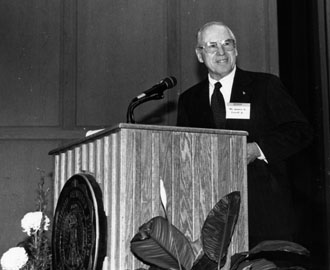James Lovell
![]() [Download Video: "View Video Clip of Jim Lovell's Ubben Lecture" - 832kb]; YouTube montage
[Download Video: "View Video Clip of Jim Lovell's Ubben Lecture" - 832kb]; YouTube montage
 December 1, 1995, Greencastle, Ind. - "Why am I here today?," asked former astronaut and retired business executive James A. Lovell Jr. during a Timothy and Sharon Ubben Lecture at DePauw University today. "Because of teamwork both with the crew and the people on the ground," added Lovell, who has received a good deal of attention since Tom Hanks portrayed him in the hit movie Apollo 13. He called the Apollo 13 mission "a great study in crisis management."
December 1, 1995, Greencastle, Ind. - "Why am I here today?," asked former astronaut and retired business executive James A. Lovell Jr. during a Timothy and Sharon Ubben Lecture at DePauw University today. "Because of teamwork both with the crew and the people on the ground," added Lovell, who has received a good deal of attention since Tom Hanks portrayed him in the hit movie Apollo 13. He called the Apollo 13 mission "a great study in crisis management."
Lovell discussed "Apollo 13: A Successful Failure" in an 11 a.m. address in the Performing Arts Center, Kresge Auditorium.
Prior to the convocation, three DePauw alumni who became leaders in the field of journalism were inducted into the Media Wall of Fame at 10 a.m. in the Center for Contemporary Media. They are:
- Richard McLoughlin, 1950 alumnus and former president and CEO of Reader's Digest;
- Eugene C. Pulliam, 1910 alumnus, former editor/publisher of the Indianapolis Star and News and one of the founders of Sigma Delta Chi/Society of Professional Journalists while a student at DePauw; and
- Eugene S. Pulliam, 1935 alumnus and publisher of the Indianapolis Star and News.
Lovell completed naval flight training immediately after graduating from the Naval Academy in 1952, and he logged more than 6,500 hours of flying time. NASA selected him as an astronaut in 1962, and he held the record for time in space with a total of 715 hours, 5 minutes until surpassed by the Skylab flights.
On December 4, 1965, Lovell and Frank Borman were launched into space on the history-making Gemini 7 mission which lasted 330 hours and 35 minutes and included the first rendezvous of two manned maneuverable spacecraft. The Gemini 12 mission, commanded by Lovell, paved the way for the future Apollo flights and brought the Gemini program to a successful close. Lovell served as command module pilot and navigator on the epic six-day journey of Apollo 8, man's maiden voyage to the moon December 21-27, 1968. Lovell and fellow crewmen Borman and William Anders, became the first humans to leave the earth's gravitational influence. He was back-up commander to Neil Armstrong for the Apollo 11 lunar-landing mission.
Lovell completed his fourth mission as spacecraft commander of Apollo 13 from April 11-17, 1970, and became the first man to journey twice to the moon. Apollo 13 was programmed for 10 days, but the original flight plan was modified en route to the moon due to a failure of the spacecraft's service module cryogenic oxygen system. Lovell and crewmen John Swigert and Fred Haise, working closely with Houston ground controllers, converted their lunar module, "Aquarius," into an effective lifeboat. Their emergency activation and operation of the lunar module system conserved both electrical power and water in sufficient supply to assure their survival while in space and for their return to earth.
On March 1, 1973, Lovell retired from the Navy and from the space program to join Bay-Houston Towing Company in Houston, and two years later he was promoted to president and chief executive officer. He became chief executive officer of Fisk Telephone Systems and then joined Centel Corporation in 1980 when Centel acquired Fisk.
After moving to Chicago, Lovell became group vice president of Centel Business Systems and then was elected senior vice president of Centel in 1982. In June 1984, he was elected a corporate executive vice president in charge of human resources, technology, corporate communications, investor and government relations and technical planning. One year later he was elected to the board of Centel Corporation and president of Centel Communications Company. In that position, Lovell directed the company in a number of emerging, high-growth telecommunications areas, including cable television and advanced business information systems.
At the time of his retirement on January 1, 1991, Lovell was executive vice president and a member of the board of directors of Centel Corporation. Centel is one of the nation's largest telecommunications companies involved in local exchange telephone and cellular operations.
Lovell continues to work to make all citizens aware of the importance of being physically fit. President Lyndon Johnson appointed him as a Consultant for Physical Fitness and Sports in 1967. When the Physical Fitness Council was revised under President Richard Nixon in 1978, Lovell was assigned the additional duty of chairman of the council.
Lovell is the recipient of numerous honors and medals, including the Congressional Space Medal of Honor in 1995 and the Presidential Medal for Freedom in 1970.